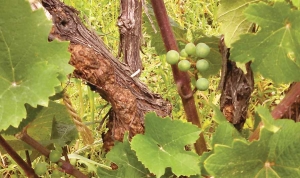
Crown galls develop following cold injury to trunks on Riesling vines in the Finger Lakes region of New York. (Courtesy Thomas Burr)
A woman can find out if she’s pregnant without going to a doctor. Soon, farmers may be able to find out if their fruit trees or grape vines have crown gall disease without going to a laboratory.
A team of Oregon State University researchers has developed a DNA test for the common plant pathogen takes growers could carry around with them.
“It functions very much like a home-pregnancy test,” said Jeff Chang, an Oregon State plant pathologist in Corvallis, one of the researchers who developed the test. The team recently published its work in the journal Phytopathology, while the university seeks a patent on the molecular tools that make the test work.
The researchers came up with the DNA reagents to detect agrobacterium, an incurable soil pathogen that causes crown gall in tree fruits and grape vines, among other plants. The bacterium attacks through wounds, spreads through pruning blades and saws, scrambles the victim plant’s genetics and causes cancer-like tumors to grow.
However, other problems, such as insect damage and fungal diseases, cause similar symptoms. The new development puts growers one step closer to diagnosing crown gall in their own fields from, say, the back of their pickup, instead of sending a sample to a laboratory.
In theory, growers could use OSU’s DNA reagents, developed by Chang’s Master’s student Skylar Fuller, on a strip of paper that, when exposed to the bacterium, would develop a dark band — similar to a positive reaction of a pregnancy test. The kit comes as a dried pellet, that growers would use with the DNA reagents.
For it all to work, the growers would have to carry around another commercially available kit that allows them to macerate plant tissue on site.






Leave A Comment